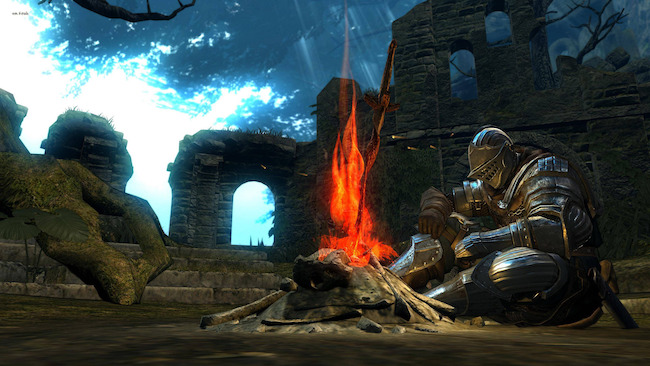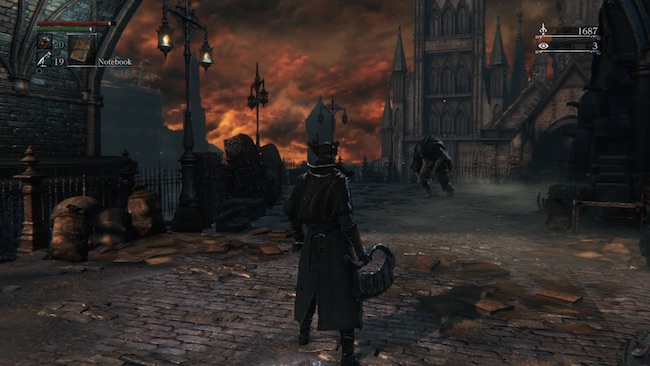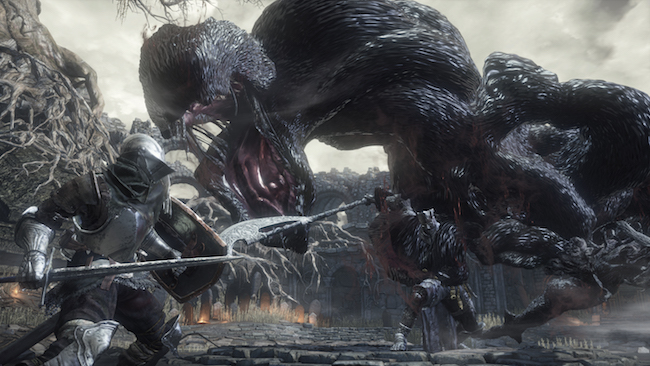
I’ve been writing reviews for several years now, and while I do enjoy analysing and critiquing games with a consumer agenda in mind, I thought it might be interesting try something new and dig into my own psyche and why exactly I enjoy particular games. When entering a review mindset, I always do my best to find a balance between expressing my own opinion and being objective. I don’t believe purely objective reviews are feasible, but I do appreciate that we need to look beyond personal biases when writing for people other than ourselves. In this new article series, however, the goal is to create an entirely subjective platform where we can talk about those games that are most special to us.
As I’ve witnessed the launch of Dark Souls III unfold, I have to admit I’m a little in awe of how popular this franchise has become. The internet is filled with hype, chatter, superiority complexes, and lots of memes. It’s heartwarming as a longtime fan—especially as Dark Souls has long been categorised as a type of game that’s “not for everyone.” I think the biggest misconception about the Souls series is that it’s excruciatingly difficult. And sure, it is the sort of game that’s designed to push you out of your comfort zone, but that’s because it’s unforgiving, not hard. Once you work out how to do something, it’s no longer so daunting. It’s a game you learn to play by dying—not unlike Super Mario Bros.

When I first encountered the original game (Demon’s Souls), it had not yet been officially released in the west. It was some sort of Asian import that included English support despite the game not being available in any English-speaking territories. It was the fallen Knight of the cover that struck my interest when I spotted it at a local GameTraders, but with only some mixed reviews from Japanese magazine Famitsu to go by, I was hesitant and decided to pass at first. However, as those of you who owned a PS3 in the early years would know, there weren’t exactly a large selection of quality exclusives to pick from, so it was only a matter of time before I’d find myself lost within the depths of Boletaria.
When I first started playing, there wasn’t yet a “Prepare to Die” slogan or “Git Gud” meme to comfort my frustrations. I simply stuck with it because I was stubborn and refused to give up. It was punishing, make no mistake, but I quickly learned that the game was also surprisingly fair. Demon’s Souls didn’t have the bonfire system the series is famous for, though. There was only an “Archstone” at the beginning of each area, which meant that everything, including the boss fight, had to be done in a single run. To succeed, you had two options: play better, or locate a shortcut. Although, it’s not as depressing as it sounds. You’re never truly alone in these games, which I think made the series so unparalleled.
There is actually a great story behind this idea too, as told by Director Hidetaka Miyazaki during an interview in 2010.


What I find incredible about that story is that I’ve only ever read it once before, and yet I can’t count the number of times I’ve shared it with others over the years. Of all the things I could have dug into first, the subject of connectivity is probably a little surprising, but the philosophy behind the Souls’ multiplayer is something I personally cherish. It often shocks people to learn that I don’t have a big interest in multiplayer. Gaming is typically a personal experience for me; one that I enjoy talking about with others, but something I prefer in solitude away from the world. It’s for this reason the Souls series resonates with me, as it allows meaningful cooperation that ultimately benefits your own playthrough.
I’m sure some will be able to relate, but I’m not especially competitive by nature. I prefer to do things at my own pace, and I always like to feel as if I’m achieving something. Generally speaking, gaming with others doesn’t fit well with that. However, in the Souls’ games, the connectivity is either indirect (bloodstains, messages, white phantoms) or proactive (cooperating via summon signs), and that suits my play style perfectly. I even appreciate the invasion system (PVP), as surprises are a big part of what makes this series exhilarating—not to mention invading and co-op is entirely optional. It’s a refined system that contributes life to an experience that is inherently devoid of life, as well as lonely and arduous.

I can’t say I expected the series would continue, but after GameSpot shocked the industry by naming Demon’s Souls their Game of the Year in 2009, everyone caught on and decided to take a closer look. I’m almost certain that’s how Dark Souls came to be; although, I suspect the change in name was mostly due to the franchise going multi-platform. Naturally, I was thrilled. I picked it up at launch and convinced several others to do the same. However, we had a big problem. FromSoftware thought it would be a great idea to use P2P for its online services (which rarely worked), and, as a result, not only could I not play with friends, I was left to fend for myself without almost any help most of the time.
I think being forced to play alone is where I developed a deep appreciation for the series. There is something special about the bonfire system in particular. A life lesson, even—that, no matter how difficult things get, there is always a point of relief somewhere up ahead if you just persist that little bit longer. To this day, I have a framed picture of a lone Knight sitting by a bonfire in my office—not just because I like Dark Souls, but to remind me to always endure, even when things take a turn for the worst. It’s not just about finding the motivation to push forward, though; it’s also about overcoming obstacles and the rewards that ensue. For as punishing as it can be, you will always feel good by the end.

What’s probably most interesting about Dark Souls as a series is how each narrative is built around lore rather than story. This is not an approach I’d typically be drawn to, as it’s more often a budget constraint than a creative decision. However, no one else delivers this quite like FromSoftware. There is something to be said about the difficulty too; not just in the challenge of the gameplay, but in how it alters the player’s perception of the world. If I’m not working on a review, I’ll rarely bother delving into the smaller nuances of a game world unless it’s especially captivating. In a Souls’ game, however, observing the fine detail of the environment is absolutely critical if you’re to have any hope of survival.
I can’t think of many other games that ground its players in the world with such physicality. Dark Souls wasn’t the first to capitalise on principles of “Metroidvania” (clearly), but the method of discovery it employs as well as the way it loops back in on itself is quite unlike other experiences of a similar nature. Everything about the environment in a Souls game is deliberate, to the point where it in itself is just as much of an obstacle as the enemies that inhabit it. Players need to develop an intimate relationship with their surroundings, learn it, and then use that knowledge to their advantage. You also need to be aware of your own physical presence too, as you just can’t go swinging a giant axe in a tight corridor.

Without fail, I’ve become enthralled with every Souls game to date (including Dark Souls II, which I felt wasn’t nearly as fleshed out as the others in terms of world design). Upon playing Bloodborne last year, though, I quickly heralded it as the epitome of the series, and, in many ways, it is (especially when it comes to lore). Personally, I felt it recaptured the best qualities of the original Dark Souls while also cutting away a lot of unnecessary fat the series could do without (or so I thought). It was, for this reason, I felt highly conflicted about the announcement of Dark Souls III. Despite Miyazaki helming as director, it felt way too soon, and I was concerned what impact this might have on the quality of the game.
I’ve been playing Dark Souls III for several weeks now, and I’m honestly shocked at how much I’ve been enjoying it. All my fears were basically for naught, and I’d even go as far as to say FromSoftware has taken the best qualities of Dark Souls (and Bloodborne) to wrap up the mainline series in a fashion that’s as fresh and exciting as it is familiar. It’s ironic too, because last month I panned Bravely Second for being more of the same, and even went into great detail why that’s not something I personally want to see in a game. And yet, here I am, praising another Dark Souls instalment. Is it the world design, the art direction, the punishing yet rewarding gameplay, the interconnectivity, or just an obsession?

I think, above all else, the reason I keep coming back to Dark Souls is the heightened sense of awareness I experience while playing. As someone who plays a lot of games, it’s easy for things to blur together after awhile, or to contently cruise through a game without taking in the finer details. I can’t deny the mechanics have lost that ‘new car’ smell over the years, but playing one of these games is more about grounding yourself in the unknown. Despite five instalments with inherent similarities, when you enter a Souls game, you never truly know what to expect. It’s that apprehension, I think, that allows you to grow intimately familiar with your surroundings while also learning from mistakes to overcome great obstacles. It can be punishing, but the sense of achievement you walk away with is unmatched, and the way the game allows you to share all of your triumphs and discoveries with others is unparalleled. That’s why I play Dark Souls.











